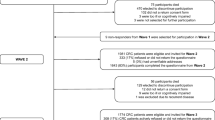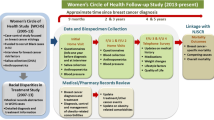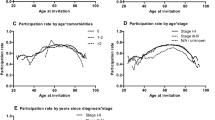Abstract
Introduction
Breast cancer is the most common type of cancer among older women. The vast majority of women with breast cancer become long-term survivors.
Methods
We selected a convenience sample of women with: (1) stage I–IIIa disease, (2) age 65-years or older, and (3) permission from physician to contact. Data were collected over 6-years of follow-up from consenting patients’ medical records, telephone interviews, and the National Death Index. Before year 4 of follow-up we attempted to relocate women lost to follow-up using a single protocol and when successful, invited them to reenroll in the study. In this secondary data-analysis, baseline characteristics were compared among subjects with continuous follow-up, those who reenrolled, died, or were lost to follow-up.
Results
Among 660 subjects, 177 had complete follow-up, 182 reenrolled after a period of non-participation, 171 died, and 130 were lost to follow-up. No important differences were found between reenrolled women and those with continuous follow-up or those lost to follow-up. There were nominal differences in age and comorbidity among women lost to follow-up compared to those with complete follow-up.
Discussion/Conclusions
This study highlights challenges in longitudinal research of cancer survivorship, specifically the potential benefit of reenrollment.
Implications for cancer survivors
Our findings provide a novel and promising approach to surmount some of the challenges in longitudinal research aimed at enhancing knowledge and the overall cancer survivorship experience of older adults.

Similar content being viewed by others
Abbreviations
- BCS:
-
breast conserving surgery
- BMI:
-
body mass index
- CDC:
-
Centers for Disease Control
- IRB:
-
institutional review board
- LA:
-
Los Angeles
- MD:
-
medical doctor
- MHI5:
-
Mental Health Index 5
- MN:
-
Minnesota
- MOS:
-
Medical Outcomes Study
- NC:
-
North Carolina
- NDI:
-
National Death Index
- PCP:
-
primary care physician
- PFI10:
-
Physical Function Index 10
- RI:
-
Rhode Island
- SSN:
-
Social Security Number
- U.S.:
-
United States.
References
Cancer facts & figures 2007. Atlanta, GA: American Cancer Society, 2007.
Breast Cancer facts & figures 2006. Atlanta, GA: American Cancer Society, 2006.
Boys A, et al. Minimizing respondent attrition in longitudinal research: practical implications from a cohort study of adolescent drinking. J Adolesc. 2003;26:363–73.
Barry AE. How attrition impacts the internal and external validity of longitudinal research. J Sch Health. 2005;75:267–70.
Rothman KGS. Chapter 6: Cohort studies. In: Rothman KGS, editor. Modern Epidemiology. Philadelphia, PA: Lippincott-Raven; 1998. p. 79–91.
Carter WB, et al. Participation of older adults in health programs and research: a critical review of the literature. Gerontologist 1991;31:584–92.
Herzog AR, Rodgers WL. Age and response rates to interview sample surveys. J Gerontol. 1988;43:S200–5.
Norris FH. Characteristics of older nonrespondents over five waves of a panel study. J Gerontol. 1985;40:627–36.
Markides KS, et al. Characteristics of dropouts in longitudinal research on aging: a study of Mexican Americans and Anglos. Exp Aging Res. 1982;8:163–7.
Matthews FE, et al. An investigation of whether factors associated with short-term attrition change or persist over ten years: data from the Medical Research Council Cognitive Function and Ageing Study (MRC CFAS). BMC Public Health 2006;6:185.
Chatfield MD, et al. A systematic literature review of attrition between waves in longitudinal studies in the elderly shows a consistent pattern of dropout between differing studies. J Clin Epidemiol. 2005;58:13–9.
Matthews FE, et al. Attrition and bias in the MRC cognitive function and ageing study: an epidemiological investigation. BMC Public Health 2004;4:12.
Schmidt JA, et al. Attrition in an exercise intervention: a comparison of early and later dropouts. J Am Geriatr Soc. 2000;48:952–60.
Goudy WJ. Effects of sample attrition and data analysis in the Retirement History Study. Exp Aging Res. 1985;11:161–7.
Zunzunegui MV, et al. Loss to follow-up in a longitudinal study on aging in Spain. J Clin Epidemiol. 2001;54:501–10.
Koss E, et al. Determinants of attrition in a natural history study of Alzheimer disease. Alzheimer Dis Assoc Disord. 1999;13:209–15.
Sharma SK, et al. Factors affecting attrition in the Baltimore longitudinal study of aging. Exp Gerontol. 1986;21:329–40.
Siegler IC, Botwinick J. A long-term longitudinal study of intellectual ability of older adults: the matter of selective subject attrition. J Gerontol. 1979;34:242–5.
Sugisawa H, et al. Characteristics of dropouts and participants in a twelve-year longitudinal research of Japanese elderly. Nippon Koshu Eisei Zasshi. 2000;47:337–49.
Yamamoto-Mitani N, et al. The impact of subject/respondent characteristics on a proxy-rated quality of life instrument for the Japanese elderly with dementia. Qual Life Res. 2004;13:845–55.
Silliman RA, et al. Adjuvant tamoxifen prescription in women 65 years and older with primary breast cancer. J Clin Oncol. 2002;20:2680–8.
Demissie S, et al. Adjuvant tamoxifen: predictors of use, side effects, and discontinuation in older women. J Clin Oncol. 2001;19:322–8.
Silliman RA, et al. The impact of age, marital status, and physician-patient interactions on the care of older women with breast carcinoma. Cancer 1997;80:1326–34.
Fleming IDC, Cooper JS, Henson DE, Hutter RVP, Kennedy BJ, Murphy GP. AJCC Cancer staging manual. Philadelphia, PA: Lippincott Williams & Wilkins; 1997.
Greenfield S, et al. The importance of co-existent disease in the occurrence of postoperative complications and one-year recovery in patients undergoing total hip replacement. Comorbidity and outcomes after hip replacement. Med Care. 1993;31:141–54.
Ware JE. SF-36 Health survey, manual and interpretation guide. Boston, MA: The Health Institute; 1993.
Ware JE Jr, Sherbourne CD. The MOS 36-item short-form health survey (SF-36). I. Conceptual framework and item selection. Med Care. 1992;30:473–83.
Clough-Gorr KM, et al. Older breast cancer survivors: factors associated with change in emotional well-being. J Clin Oncol. 2007;25:1334–40.
Silliman RA, et al. Breast cancer care in older women: sources of information, social support, and emotional health outcomes. Cancer 1998;83:706–11.
Ganz PA, et al. Life after breast cancer: understanding women’s health-related quality of life and sexual functioning. J Clin Oncol. 1998;16:501–14.
Ganz PA, et al. Breast cancer survivors: psychosocial concerns and quality of life. Breast Cancer Res Treat. 1996;38:183–99.
Sherbourne CD, Stewart AL. The MOS social support survey. Soc Sci Med. 1991;32:705–14.
Ganz PA, et al. Breast cancer in older women: quality of life and psychosocial adjustment in the 15 months after diagnosis. J Clin Oncol. 2003;21:4027–33.
SAS Institute: Statistical Analysis System (SAS). Cary, NC: SAS Institute, 2006.
Deeg DJ, et al. Attrition in the longitudinal aging study Amsterdam. The effect of differential inclusion in side studies. J Clin Epidemiol. 2002;55:319–28.
Feng D, et al. Attrition of older adults in longitudinal surveys: detection and correction of sample selection bias using multigenerational data. J Gerontol B Psychol Sci Soc Sci. 2006;61:S323–8.
Rabbitt P, et al. Neglect of dropout underestimates effects of death in longitudinal studies. J Gerontol B Psychol Sci Soc Sci. 2005;60:P106–9.
Slymen DJ, et al. Determinants of non-compliance and attrition in the elderly. Int J Epidemiol. 1996;25:411–9.
Acknowledgments
This work was supported by grants CA106979, CA/AG 70818, CA84506, and CA92395 from the National Cancer Institute.
The authors have no conflict of interest.
Author information
Authors and Affiliations
Corresponding author
About this article
Cite this article
Clough-Gorr, K.M., Fink, A.K. & Silliman, R.A. Challenges associated with longitudinal survivorship research: attrition and a novel approach of reenrollment in a 6-year follow-up study of older breast cancer survivors. J Cancer Surviv 2, 95–103 (2008). https://doi.org/10.1007/s11764-008-0049-y
Received:
Accepted:
Published:
Issue Date:
DOI: https://doi.org/10.1007/s11764-008-0049-y




